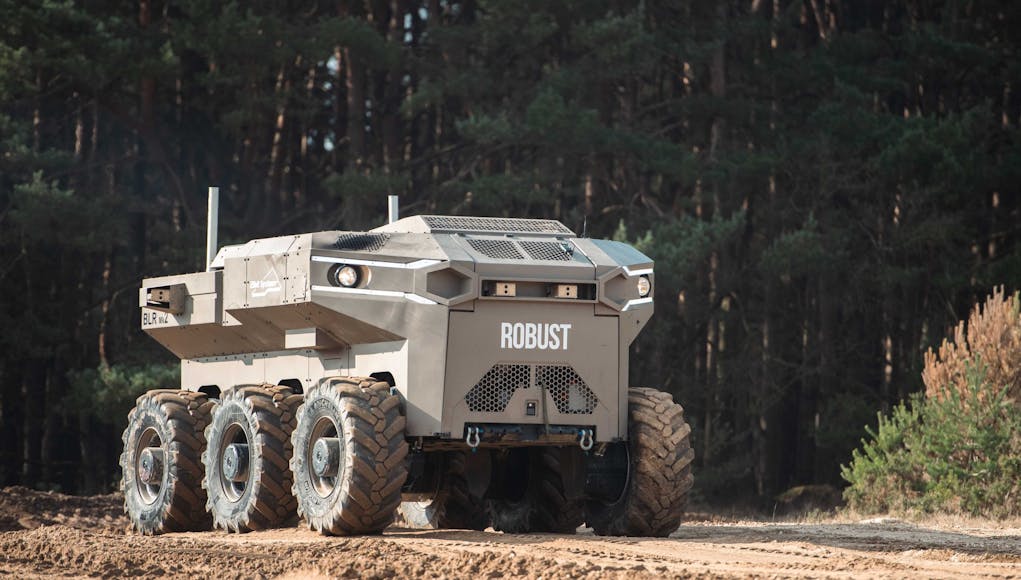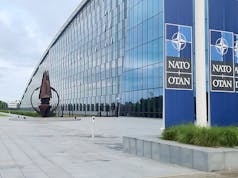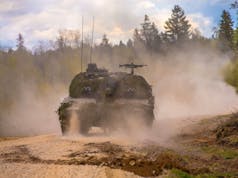The United Kingdom has conducted a trial of heavy uncrewed ground systems (H-UGVs), inviting companies from the Human-Machine Teaming framework to demonstrate their vehicles’ capabilities to the British Army.
The two-week trial took place at the Armoured Trials and Development Unit in Bovington, Dorset.
In this context, the British Army say that “heavy” refers to any remotely controlled system weighing over five tonnes.
Organised by Defence Equipment & Support’s Future Capability Group (FCG), the trial featured three companies showcasing their platforms:
- Elbit with its Robust
- Milrem and its Type X
- Rheinmetall with its Wiesel
The H-UGVs were evaluated based on various criteria, including speed, performance in challenging terrain, and communication systems, say the British Army.
James Gavin, head of the Future Capability Group, was quoted in a press release as saying:
“Over the two weeks of trials and demonstrations we have had the door opened to where we may one day go with these vehicles. This has been about drawing industry and the Army together to put these platforms through their paces and see what they can do now, and what might be possible in the future. Next, we will look at the data generated during the trials to see what worked, what needs more thought and where we could go next. While we are only at the very early, tentative stages of this process, the H-UGV trials have been a success in that they have opened our eyes further to what capabilities can be achieved by uncrewed ground vehicles in the decades to come.”














I was the military officer in the UGV/Robotics division at RARDE Chertsey in 1989-91. Sadly the Directorate of Doctrine (Army) was little interested in what we did then, even though our various programmes were 15 years ahead of civilian R&D. Hopefully there is a more enlightened understanding these days.
Hi Graham,
I remember Chertsey. I worked at RAE Farnborough from ’89 to ’01 and did some trial at Chertsey one time. Happy days.😀
Unfortunately, you have summed up some officers attitude only too well and the Army’s awful record of procurement over the last 20 years or more is probably down to too many preconceived or outdated ideas. Developing and exploiting new tech is a team effort between end user and the techies, each need to listen and learn from the other. If one side closes their minds to the other you get left behind and waste shed loads ot treasure to boot.
Cheers CR
Spot on, one might have thought it obvious to any such process of focusing on the best guess and solutions to concentrate upon. Traditionally so much has come out of this Country because of private perseverance when Govt or authorities showed no interest. Problem is it’s generally too expensive to go alone especially for individual innovators, or companies and banks too risk adverse to do that anymore so Govt related support is vital to progress all manner of innovation that is vital to support the re building of British industry. Read only last week how the US Govt is investing billions in a particular future tech (which escapes me) that we are barely investing millions in. We will never compete with them but the role of Govt is vital here (as even the US shows) and as such the sort of collaboration you highlight is the very least you need to do to focus limited funds on the most promising areas and programs. In this particular case it was obvious for years that such technology would be useful indeed required at some stage so what was done (as we have done with lasers) to achieve set goals? The Military, Universities Govt, Industry generally, why was a joint programme of some sort not developed to define, research and deliver potential solutions? New focused businesses could have come out of it as for example has happened on a different front from Williams and McLaren due to their work in F1 producing the hybrid electrical systems for their cars that have been utilised for the standard Formula E platform and even more diversely in the case of Williams, into laser energy solutions from Rolls Royce.
I guess that might explain why only Israeli, German and Estonian companies are deemed fit to offer a solution. Britain never seems at the forefront of new technology solutions any more, despite capabilities and creativity to do so exists and a history of being at the forefront, it’s simply not recognised or supported in almost any sector, so when the need for such technology is indeed recognised we are in no position to provide it. The exact same thing happened in wind power despite the fact the PM likes to boast about our prowess in the sector and how we can apparently bring it to the World. As for giga factories the worst case scenario has arrived where those foreign companies aren’t even interested in building them here. Can’t see the situation Improving and as hard as I find it to say it it was the one positive of Johnson that he at least saw the problem and tried to improve matters, Rishi seems to have little interest in such vision sadly, the belt tightening being the ever present priority. But seriously when the Estonians can do it affordably and we can’t how close to rock bottom are we to vision bankrupts.
The U.K. is at the forefront of many different technology solutions, presumably it’s just that no company in the U.K. is working in this particular sector that’s all.
why though
More profitable areas? The problem with defence is that there’s only a small number of customers, and if you don’t secure a deal with your home defence ministry it’s going to be hard to get foreign defence ministries interested unless you have something truly unique.
i suspect the market for 5 ton+ off Road autonomous vehicles is pretty niche and your only likely to get businesses working in that area if it government sponsored.
Perhaps that is the problem, lack of imagination to exploit new applications and new potential markets. Sticking to an imagined hard dividing line between military and civilian applications.
5 ton plus sounds like the ideal size to follow combine harvesters in relays, to collect grain and take it to dry storage. Or to follow road crews with gravel/hardcore. What about forestry equipment hauling logs etc along fire breaks and uneven terrain. Then there are logistical companies like Amazon.
The problem is legislation and safety regs means there is no market.
With the combine harvester example, it’s only any good if it’s road legal…and let’s be honest no government is going to make a heavy hauler autonomous vehicle road legal for a very long time. Also the way it works is that generally the farmer will use their own tractors for moving the grain and hire a combine and driver..
But the reality is until legislation is ready and all the safety cases made…there is no market for these. It’s also a real counter intuitive issue around the safety cases…Humans are generally a bit shit…and well human, that means we’re always at risk of crashing…an autonomous vehicle needs to be pretty much perfect before any legislative will pass the legislation needed…also there is the stickler wicket of lability and insurance etc….so it’s a case of yes but no…when the legislation and law catches up maybe there will be a market.
The issue is that the UK doesn’t respect engineers and the senior managers get promoted not through capability but for other reasons. We lack good managers in the UK and it’s an endemic problem that needs root and branch reform. From experience if someone is bad at their job in an engineering firm it is really difficult to fire them through employment law ergo lots of companies promote poor quality people into positions of power to get them out of specific groups and divisions.This is akin to the Peter principle:
https://en.wikipedia.org/wiki/Peter_principle
However, the key difference, and where I don’t agree with this principle, is that many of these senior folks were never very good and what they did in the first place. This coupled to employment law and unions means managers often promote poor quality people sideways or upwards to get them out of their respective business units.
Then we have the lack of support from governent and banks for moving technology through the TRL levels. We need a holistic funding approach to get high tech products to market and this includes changes in management training, promotion of highly tecnhical people into positions of power, recognition of the word “engineer” as a reserved profession (anything else is a technician) and support at all levels of the TRL pyramid.
I think the attitude to scientists and engineers in the UK was summed up by Churchill (and a few other politicians):
“Scientists are on tap but not on top”
This pretty much sums the UK attitude to engineering as well as science. I’ve worked extensively in France, Germany, Japan and the US and technical people are hugely respected in those countries.We just don’t value engineers or scientists in the UK and this is affecting our econmomic performance very badly in the 21st century where technical skills are a premium and soft social science people and invariably not needed (ergo we create lots of non-jobs in the UK such as diversity officers and pay them extremely well for doing zero work).
careful…or you may get cancelled 🙂
Andrew, you sound like a professional engineer to me – and I agree with every word. Very few British companies are headed by engineers, unlike in Germany and elsewhere, and neither are engineers much valued in our armed forces, excepting that CAS (des) is an engineering officer – surely to be a one-off.
There’s more than you’d imagine. But they’re probably engineering companies who only offer services to other companies, and so unknown to the public. Every CEO at my company has an engineering background, as has most of the senior management.
My previous but one manager spent most of his time doing whatever in his office and lied that he had been chasing parts and tooling. Only real time he seemed interested was if a KPI looked like it was going to fail or an important person visited. They brought in a new white board with problem sheet and said we would get follow up responses. It didn’t last long and he seemed to get annoyed when we asked for more pages as we filled up the five that were on the board !
So the old promoted to the level of their incompetence is upgraded to promoted beyond the level of their incompetent ( to get them out the way)….I can see that working well.
Dear Graham,
Interesting perspective and a real eye opener. It’s a shame that people didn’t see the value of what you did then. It’s begining to change slowly in the UK. We’ve got to learn to adapt to newer technology much more quickly to stay ahead of the game. I think the MoD is now realising this should be the case and they do have some good programmes ahead in terms of technology demonstrators. They just need to make sure it goes up the TRL ladder very quickly so these products are available early to front line troops.
Best wishes,
Andrew.
Hi Andrew, I recall reading about the German fielding of Goliath UGVs in mid-WW2, so it was strange that there was resistance to further developing the Chertsey technology demonstrators so many years later in the late 80s/early 90s. The Sappers are likely to field the first British Army UGVs (I am not counting EOD Wheelbarrow etc). Graham.
It sounded promising until I read this. “where we may one day go with these vehicles.” The 2040s maybe?
Sorry for being cynical but this could be one way of sorting out the shortage of new fighting vehicles? Like the farmer’s tractor, it will be only a matter of time before driverless tractors and tanks will be operated by robots.
Well the Russians just yesterday in the guise of the Wagner Group boss after a demonstration, were talking about the imminent use of their Robotic tracked anti tank solution being introduced into the war zone to take out Leopards and Abrams. Now I suspect this is more hype than functional effective reality and reflective of their fear of being outgunned, but it’s rather sad to reflect upon the fact that even Putin’s chef having more vision on future such developments than the MoD likely has or has certainly historically shown. Even this call for demonstrations sniffs of a belated attempt to get real and show willing than any pre ious or even present plan to demonstrate real commitment to the technology. Rather like the pre war Navy not really seeing that the future of aircraft was monoplanes until the reality of it being belatedly forced upon them.
Russians have probably just taken some old Nazi Goliaths out of their Great Patriotic War museums 🤷🏻♂️
https://en.m.wikipedia.org/wiki/Goliath_tracked_mine
i was just thinking the same thing.
The current thinking is to stem the flow of Ai into our societies…..good luck there. Whether the MOD is turned on or not the impact of Ai on the battlefield will be incalculable and not in a good way. Even low military budgets countries could attain considerable battlefield prowess using inexpensive remote systems controlled not by man but by robots. Robotics will account for around 60% of manual employment globally it’s estimated, and defence will not be exempt, on the contrary, remote systems resulting in fewer casualties and human costs will be very appealing. One interesting aspect of remote systems is the possibility of hostile engagement without it immediately escalating, in short, a buffer to trigger responses. Conceptually, a hostile campaign could, in theory, be fought over a considerable period without ever firing soldier to soldier.
reminds me of an old Star Trek episode – where robots fought a war…which had been going on for centuries, and as such had devestated the planet so everyone lived underground…and had forgotten what the war was about ….or something like that
Very prophetic these sci-fi guys are it seems.
I do wonder about the viability of these vehicles and the expected operational concepts they are being designed to undertake. Especially over whether they are actually cost effective and actually fit for purpose? The Ukraine War would be the obvious test choice.
In essence the current thrust is in the direction of logistics support or force multipliers. Whereby they act as luggage mules or like the loyal wingman concept. They are used to to swell offensive/defensive numbers that are coordinated by operators, either in static or mobile locations.
However, the future concept of these vehicles, operating alone using AI. Then brings the legal ramifications of machines targeting humans with no human intervention. Which is pushing the boundaries way too far.
Operationally, unmanned vehicles can be made to work, so long as they are in close proximity to the operator. Where the line of sight data communications can be maintained. Yes, satellite communications is useful, but it is too easily jammed as the transmission from the satellite is really weak. Whereas jamming a vehicle’s communications that is within line of sight, takes significantly more jamming power. Which then makes the jammer much easier to target.
However, Estonia did prove that their Milrem’s Themis vehicle provided excellent logistical support to both vehicle mounted troops and dismounts. Though the topography that it operated in, definitely suited this type of vehicle. The only complaint I’ve heard, is the range and charge time of the battery.
The next step up would be the force multiplier combat vehicle. That Howe & Howe’s Ripsaw M5 (surprisingly not included in this trial) and the larger Milrem’s Type X are looking to fulfill. These can both be fitted with a variety of autocannons, machine guns, grenade machine guns and ATGWs. Both are electrically powered and are very quiet running on band tracks. Much like a UAV they can be operated by one person, though two is more preferable as it increases situational awareness.
It remains to be seen if this trial keeps the requirements simple or starts snowballing by adding more and more. Which then leads to gold plating and excessive costs/delays.
Davey, UAVs have been in service for decades, initially unarmed (from mid-60s) doing ISTAR, and later some being fielded as attack drones. I don’t see that we should be reticent about armed UGVs. Armed UGVs can still have the man in the loop to make firing decisions.
Compared to this UGV, the Russian Marker seems like a joke!
Lugging loads is about it for infantry.
Anti Tank? …but with brimstone as a remotely placed launch platform.
Probably the biggest plus would be for engineers and sappers doing breaching . Towing/ carry a Giant Viper or equivalent into position and let it loose.
Give it a gun and call it a T1…if you then have the Skynet sat system as a way to communicate with it ….job done…
It is one of the options that you need.https: //www.edrmagazine.eu/a-robust-combat-unmanned-vehicle-from-israel